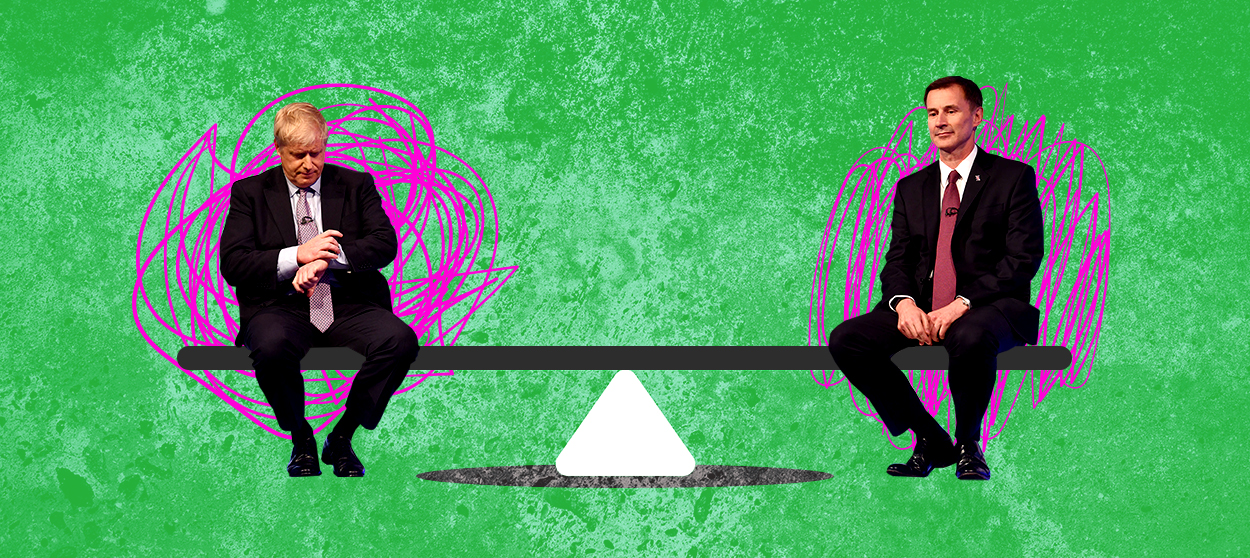The U.K. has 2 very bad choices for the next prime minister
There are no good options


A free daily email with the biggest news stories of the day – and the best features from TheWeek.com
You are now subscribed
Your newsletter sign-up was successful
Theresa May's run as British prime minister is ending, and so the U.K. finds itself at yet another electoral crossroads. May's replacement will have three months — really just 30 working days — to achieve what she couldn't in three years: find a viable path out of the Brexit mess. Given the circumstances, we might soon come to view the election's loser as its real winner.
Two candidates are vying for the job. The former foreign secretary, Boris Johnson, is set to face his replacement, Jeremy Hunt. Being placed opposite Johnson makes one the serious candidate by default, but in reality, neither of them warrant optimism.
Let's start with Hunt. From 2012 to 2018, Hunt led the National Health Service. That time was marked by the Tory austerity program launched by former Prime Minister David Cameron and ardently maintained by May. In that era of reduced government spending, Hunt did incredible damage to the NHS. He thought it a good idea to have the NHS "expand to provide seven-day services so that more patients get the best care when they need it." Sounds like a noble goal, if only it had been given any sort of funding with which to deliver. Having doctors work nights and weekends meant higher costs, of course, but Hunt's solution was to pay doctors weekday wages for these "unsociable hours." Junior doctors — those with up to 14 years of service — fought back against the removal of the extra pay, as well as the loss of their scheduled pay increases. In the end, Hunt's attempt to provide more with less led to the first strike in NHS history to impact the delivery of emergency, maternity, and intensive care services. In practice, Hunt's maneuver was either an exercise in magical thinking or a straightforward attempt to euthanize the NHS.
The Week
Escape your echo chamber. Get the facts behind the news, plus analysis from multiple perspectives.

Sign up for The Week's Free Newsletters
From our morning news briefing to a weekly Good News Newsletter, get the best of The Week delivered directly to your inbox.
From our morning news briefing to a weekly Good News Newsletter, get the best of The Week delivered directly to your inbox.
When the coalition government of Tories and Liberal Democrats took control of Parliament in 2010, they lowered the bar for emergency health-care performance. Results continued to worsen when Hunt took charge in 2012. At the same time, the number of NHS hospital beds dropped, meaning some 8,000 fewer beds were available for patients. This might help explain the shift in emergency care performance: You can't move people from the emergency room to hospital beds that no longer exist. That the beds were gone was a deliberate choice: While NHS funding grew between 4 and 9 percent annually under the stewardship of the Labour Party, it averaged around one percent from 2010 to 2015 under the Tories. Three leading think tanks agree that NHS funding needs to increase at least 4 percent a year to keep up with demand. Despite a growing, aging population, the Tories chose to dramatically slow the rise in funding for the health service on Hunt's watch.
Caroline Molloy, the editor of OurNHS, sums up Hunt's leadership as "one of missed targets, lengthening waits, crumbling hospitals, missed opportunities, false solutions, funding boosts that vanished under scrutiny, and blaming everyone but himself." Hardly the sort of meritorious service deserving of promotion to the global stage.
If Hunt is a poor candidate, then what about Johnson?
A month ago, I detailed the multifarious reasons Johnson is unfit for the job of prime minister. Since then, it's almost as if he's gone out of his way to confirm my assessment. As he readied himself for hustings, Boris had something approximating a knock-down-drag-out brawl with his partner. That quarrel was so loud, violent, and disruptive that the police were called. Some of the neighbors thought a murder was in progress. If this is how Johnson behaves in the run-up to becoming PM, what might follow?
A free daily email with the biggest news stories of the day – and the best features from TheWeek.com
How he'll treat the U.K. citizenry remains an open question. But Johnson's treatment of Kim Darroch, the embattled and now former ambassador to the U.S., seems telling. Leaked diplomatic cables from Darroch embarrassed President Trump, and Johnson was given ample opportunity to back Darroch, but instead chose to side with Trump. He threw his country's own ambassador under the bus for doing his job, and in doing so, showed his willingness to hold Trump's pocket. A Prime Minister Johnson could further degrade the foreign service's ability to properly do its job.
There's even been talk of Johnson "proroguing" Parliament — effectively hitting the pause button on democracy — in order to force a disastrous no-deal Brexit through.
Perhaps the most disheartening fact of all is that none of this really matters, given the electoral process: Just 0.3 percent of the electorate — largely old, white, and male — is expected to decide the next prime minister for the rest of the nation.
Indeed, liberal democracy is in a bad place. And it seems the U.K. is set to be worse off when this race is over. Unfortunately, for 99.7 percent of U.K. voters, the matter is already out of their hands.
Chris Oestereich is the publisher of the Wicked Problems Collaborative and the director of publications at Thammasat University’s School of Global Studies. He is the author of a book about Brexit, The Dividing Kingdom, and the editor of What Do We Do About Inequality?
-
 Trump wants a weaker dollar but economists aren’t so sure
Trump wants a weaker dollar but economists aren’t so sureTalking Points A weaker dollar can make imports more expensive but also boost gold
-
 Political cartoons for February 3
Political cartoons for February 3Cartoons Tuesday’s political cartoons include empty seats, the worst of the worst of bunnies, and more
-
 Trump’s Kennedy Center closure plan draws ire
Trump’s Kennedy Center closure plan draws ireSpeed Read Trump said he will close the center for two years for ‘renovations’
-
 The billionaires’ wealth tax: a catastrophe for California?
The billionaires’ wealth tax: a catastrophe for California?Talking Point Peter Thiel and Larry Page preparing to change state residency
-
 Bari Weiss’ ‘60 Minutes’ scandal is about more than one report
Bari Weiss’ ‘60 Minutes’ scandal is about more than one reportIN THE SPOTLIGHT By blocking an approved segment on a controversial prison holding US deportees in El Salvador, the editor-in-chief of CBS News has become the main story
-
 Has Zohran Mamdani shown the Democrats how to win again?
Has Zohran Mamdani shown the Democrats how to win again?Today’s Big Question New York City mayoral election touted as victory for left-wing populists but moderate centrist wins elsewhere present more complex path for Democratic Party
-
 Millions turn out for anti-Trump ‘No Kings’ rallies
Millions turn out for anti-Trump ‘No Kings’ ralliesSpeed Read An estimated 7 million people participated, 2 million more than at the first ‘No Kings’ protest in June
-
 Ghislaine Maxwell: angling for a Trump pardon
Ghislaine Maxwell: angling for a Trump pardonTalking Point Convicted sex trafficker's testimony could shed new light on president's links to Jeffrey Epstein
-
 The last words and final moments of 40 presidents
The last words and final moments of 40 presidentsThe Explainer Some are eloquent quotes worthy of the holders of the highest office in the nation, and others... aren't
-
 The JFK files: the truth at last?
The JFK files: the truth at last?In The Spotlight More than 64,000 previously classified documents relating the 1963 assassination of John F. Kennedy have been released by the Trump administration
-
 'Seriously, not literally': how should the world take Donald Trump?
'Seriously, not literally': how should the world take Donald Trump?Today's big question White House rhetoric and reality look likely to become increasingly blurred
